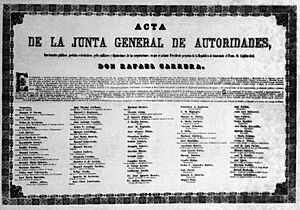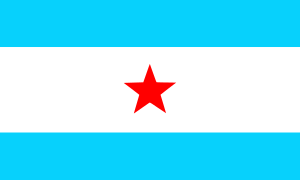José Víctor Zavala facts for kids
Quick facts for kids
José Víctor Ramón Valentín de las Ánimas Zavala y Córdova
|
|
|---|---|
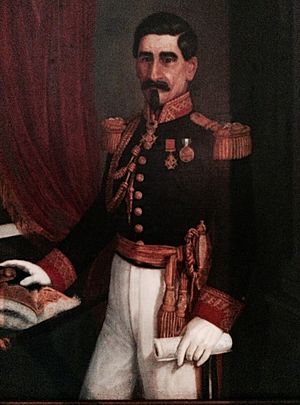
Mariscal Zavala portrait
|
|
| Born | November 2, 1815 Guatemala City |
| Died | March 26, 1886 (aged 70) Guatemala City |
| Place of burial | |
| Allegiance | Guatemala |
| Service/ |
|
| Years of service | 1848 - 1885 |
| Rank | Field Marshal |
| Battles/wars |
|
José Víctor Ramón Valentín de las Ánimas Zavala y Córdova (born November 2, 1815 – died March 26, 1886) was a famous Guatemalan military leader. He reached the high rank of Field Marshal. He fought in important wars, including those led by Rafael Carrera and the National War of Nicaragua against William Walker.
After President Carrera passed away in 1865, many thought Zavala would become the next president. However, another Field Marshal, Vicente Cerna y Cerna, was chosen instead. Today, a military base in Guatemala City is named "Mariscal Zavala Brigade" in his honor.
About José Zavala
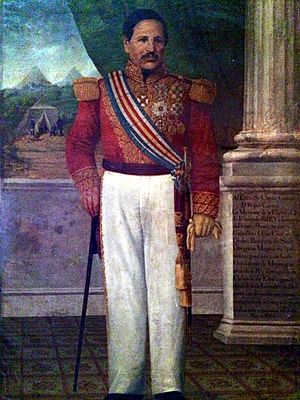
José Zavala was born in Guatemala City. He grew up with strong moral values that guided him throughout his life. When he was young, he went to the United States for a good education. His father hoped he would become a lawyer at the Academy of Sciences of Guatemala. But Zavala's personality was not suited for a law career.
Zavala began his military journey by joining the Army. He helped stop peasant uprisings led by Rafael Carrera. It's interesting because Carrera later became his loyal friend and colleague. Zavala took part in many military trips. For example, he fought against Serapio Cruz in Patzún in July 1848. He also participated in the famous Battle of La Arada on February 2, 1851. Later, he fought against Honduras in 1853. Because of his bravery, he was seen as one of the heroes who won at Fort San Fernando de Omoa.
He served under Rafael Carrera, who became the Commander in Chief of the Guatemalan Army in 1844. Carrera later became president for life from 1854 to 1865. In 1854, Zavala was one of the people who signed the document making Carrera president for life. Zavala was a close friend of Carrera. He was even speaking French with Carrera's son, José, just before José died in 1853.
Fighting William Walker
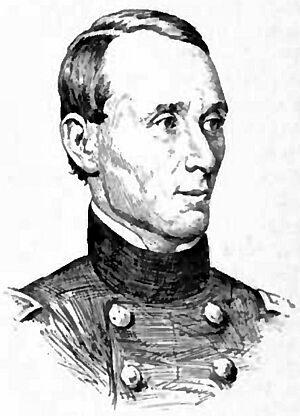
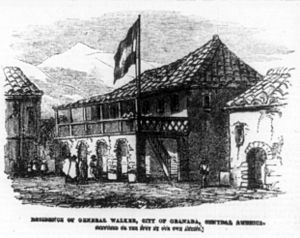
At 42 years old, Zavala achieved his biggest military success. He was a Sergeant Major when Carrera sent him to Nicaragua in 1856. He joined the National War of Nicaragua against William Walker. This was part of the Allied Central American Army. He led his troops through Nicaragua and joined General Mariano Paredes. Together, they won a great victory.
After General Paredes died, Zavala took command of the Guatemalan forces. He was promoted to Lieutenant Colonel. One historian called him the "sliest" of the leaders in that campaign. During the war, he had some disagreements with the main Allied commander, Salvadoran General Ramon Belloso.
On October 12, 1856, during the destruction of Granada, Zavala showed incredible courage. He ran across the city square to the house where the enemy was hiding. Under heavy gunfire, he grabbed the enemy's flag and brought it back. People said he shouted, "Filibuster bullets don't kill!" He was not hurt during this brave act. After Walker surrendered, Zavala took control of the city of Rivas on May 1, 1857.
After the war, he returned home. Six years later, he joined a mission against the President of El Salvador, Gerardo Barrios. Zavala was known as the "Guatemalan D'Artagnan" because of his bravery. When he came back from the war, he received a special medal and was promoted to Colonel. He continued to serve under Captain General Rafael Carrera and eventually became a Field Marshal.
Changes in Government
After President Rafael Carrera died on April 14, 1865, there was a time of political change in Guatemala. Many people thought Marshal Zavala would become the new president. But Marshal Vicente Cerna was appointed acting President instead. Cerna then called for elections in January 1869. The Conservative party supported Cerna, while the Liberal party supported Zavala. Cerna won the election, but there were many claims of cheating.
A few weeks later, Field Marshal Serapio Cruz started a rebellion. This rebellion ended with the victory of the Liberal forces in 1871. These forces were led by Miguel García Granados and Justo Rufino Barrios. In the new government, Zavala served as the deputy Secretary of War. Later, in 1885, he was General Barrios's Chief of Staff during the campaign for Central American Union. Even though he was old, he was highly respected for his experience and knowledge.
Death
After General Barrios died in Chalchuapa, Zavala stopped his public work. He passed away on March 26, 1886. His remains are buried in the General Cemetery of Guatemala City.
See also
 In Spanish: José Víctor Zavala para niños
In Spanish: José Víctor Zavala para niños
 | Valerie Thomas |
 | Frederick McKinley Jones |
 | George Edward Alcorn Jr. |
 | Thomas Mensah |


